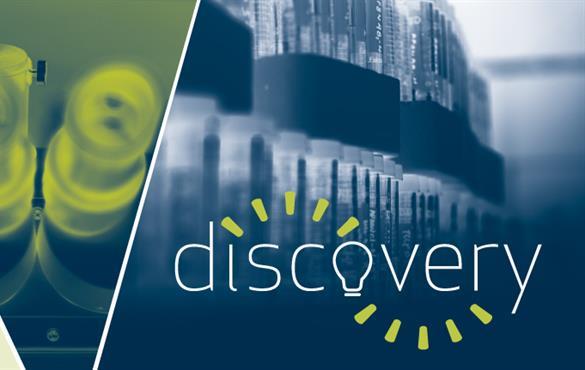HIVE wins $30,000 grand prize in 2019 Discovery Competition
Medical technology team HIVE wins Discovery Competition, which includes a $20,000 cash prize

A team of students that developed a way to monitor intravenous medication compliance has won the 2019 Discovery Competition sponsored by the McKelvey School of Engineering. The prize includes a $20,000 cash award, $5,000 in-kind services from Custom Technologies and $5,000 in in-kind legal services from Polsinelli, which has sponsored the Discovery Competition for the past five years.
Four teams competed this year for the prizes, which include six months of complimentary workspace from TechArtista, a collaborative workspace in the Central West End founded by McKelvey Engineering alumnus Chris Holt. In addition to 24/7 access to the workspace, team members will have the opportunity to connect with the St. Louis professional community and increase access to the St. Louis ecosystem.
"This year's teams were a great mix of teams ready to hit the ground running with their products and teams with exciting potential technology development," said Dennis Mell, director of the Discovery Competition and professor of practice in electrical & systems engineering.
HIVE's technology is designed to monitor compliance with outpatient parental antimicrobial therapy (OPAT). The goal is to provide accurate, real-time data to physicians and insurance companies including but not limited to: when the patient takes their medication, how many times a day the patient takes their medication, and how long the patient takes their medication. The key aspect of its technology is that it will not require any additional steps by the user. OPAT costs about $300 per day, which is about 10 times less expensive than inpatient care. However, OPAT has a 25% unplanned readmission rate overall, with 9% of the 25% due to non-compliance. The group's market will be the physicians and pharmacists who re-admit noncompliant patients, and those who spend time following up with patients to ensure their compliance.
Team members include Joe Beggs (CEO/ engineer), a student majoring in biomedical engineering; Sai Dodda (clinical coordinator), a student at St. Louis College of Pharmacy; Allie Frank (clinical coordinator), a master's student in occupational therapy; Glen Kleinschmidt (engineer), a BS/MS student in biomedical engineering; and Chris Sleckman (engineer), a BS/MS student in biomedical engineering.
The team winning second place, which includes a $7,500 cash award, $2,500 in in-kind legal services from Polsinelli and an invitation to compete in the 2020 final Discovery Competition, was Dose To Go, which developed a smart vaccine patch designed to ensure accurate, localized and pain-free vaccine delivery to be administered at home. This vaccine patch integrates a bioreactive base, which allows for temporal progress tracking, accurate drug delivery confirmation, and automatic linkage to user's online health record for convenient vaccine record. Team members include Thao Cao, a student majoring in biomedical engineering; Noah Goldstein, a student majoring in computer science; and Christopher Sheffels, a student majoring in mechanical engineering with a minor in materials science & engineering.
Tying for third place, which includes a $2,500 cash prize for each team and $2,500 in legal services from Intellect Law Firm, were the Flex.ai team and Mediband team.
Flex.Ai is a cloud-based platform designed to improve the life of all physical therapy patients. With advanced computer vision algorithms using posture recognition, the Flex.Ai app tracks a patient in real time and gives them feedback throughout each exercise. Through the use of automated reminders and progress tracking, patients with Flex.Ai will recover quickly and properly. Team members include Nick Cornejo, a student majoring in mechanical engineering with a minor in computer science; Michael Greer, a student majoring in computer engineering with a minor in robotics; and Jack Leshem, a student majoring in computer science with a second major in finance.
MediBand is working to make medication management easy through a low-cost Internet of Things (IOT) bracelet that manages a patient's prescriptions right on their wrist. Its technology serves individuals who are prescribed time-sensitive medication by integrating their medication into a consistent part of their daily lives. The team is seeking funding to build a low volume of bracelets that to give to prospective users to further explore market needs. Team members include Sam Margolis, a student majoring in computer science; Anton Salem, a student majoring in systems science & engineering; and James Swingos, an undergraduate student at Harvard University.
Click on the topics below for more stories in those areas
- Undergraduate Students
- Entrepreneurship
- Graduate Students
- Brief
- Alumni
- Research
- Computer Science & Engineering
- Electrical & Systems Engineering
- Mechanical Engineering & Materials Science
- Energy, Environmental & Chemical Engineering
- Biomedical Engineering



